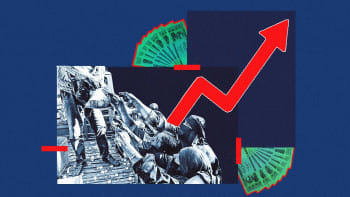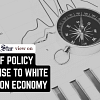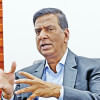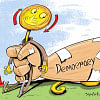‘Booming’ economy, struggling people

When it comes to the simultaneous existence of growth and crisis, Bangladesh has become a model. There is a growth of per capita income on the one hand, and financial hardship, unemployment, hunger, malnutrition, and financial insecurity suffered by the majority of people on the other. Unprecedented expansion of private banks is happening while the banking sector faces a crisis with rising defaulted loans and big theft of bank money. Over the last decade, we have seen a construction boom on the one hand, and the highest rates of deforestation, air and water pollution, and land- and river-grabbing on the other.
The super active propaganda machine of the government as well as their local and foreign partners consistently try to make us believe that the country is on the highway of development, and they often point to big infrastructure projects—most of which are extremely expensive because of high corruption and inefficiency—as proof. Yes, many megaprojects have been taken up during this government's time. But a good number of these megaprojects will be dangerous and/or big liabilities for Bangladesh in the long term. For example, the Rampal Power Plant, in partnership with the NTPC of India, will harm our precious Sundarbans severely. This plant created the path for many more "red category" projects in the area, which means it will massively damage the environment.
There are more coal-based power plants in the coastal areas in collaboration with China and Japan, requiring big loans, which will make these areas more vulnerable to climate change effects. Another project is a combination of both catastrophic risks and immense loans (nearly $12 billion), which is the Rooppur Nuclear Power Plant, in partnership with Russia. There are also big import projects of LNG with the US and other countries. All these projects have contributed to a huge amount of foreign debt, which is putting pressure on the already depleting foreign exchange reserves. It is not possible to find any rationale behind these projects when there are much better alternatives, for example, for energy and power sectors, that are cheaper and environment-friendly.
It is not surprising to find Bangladesh as a country of fast-growing superrich oligarchy. Government reports (Household Income and Expenditure Survey of 2010, 2016 and 2022), too, confirmed that along with the fast growth of affluence among a few, inequality has also risen fast. In 2010, the income ratio between the top five percent of the income groups and the lowest-earning five percent of the population was nearly 30:1. In 2016, this ratio increased 60 times. In 2022, it increased more than 80 times. This does not give the real picture, because we know the declared income of the rich people is only a small part of their real wealth accumulated at home and abroad.
So growth and deprivation, affluence and poverty, propaganda of dazzling growth and the harsh reality all go together. Who sees what depends on their social position. The beneficiaries of the present model are not able to see what people in general experience in their daily lives.
Let's consider the fact that in Bangladesh, the government calculates per capita income exceeding Tk 300,000. This figure averages income across the entire population, including children, unemployed, informal workers, retirees, and the wealthy. It suggests an average monthly income of over Tk 25,000 per person. However, for many families, particularly those with lower income, the reality is starkly different. They struggle to afford food and shelter for survival, let alone nutritious meals. Their family income is likely far below Tk 30,000 per month, let alone per person.
The top five percent have made their share of GDP increase significantly, while the bottom half's share has shrunk. The small segment of the population consisting of corrupt policymakers and officials, loan defaulters, extortionists and land-river grabbers are significant beneficiaries of the current economic model. Their incomes have skyrocketed due to commissions from projects and contracts, high-cost infrastructure construction, and illegal activities. Nearly 95 percent of people haven't seen a real increase in income and standard of living. Meanwhile, daily necessities have become more costly, so have healthcare and education; utility bills are also rising. This raises the crucial question of what true economic security entails.
Therefore, when we talk about economic growth, we must count the severely negative economic effects on the people and the country. Otherwise, it will be a one-sided, flawed story. The way GDP is calculated doesn't take into account many important factors that contribute to a country's development trajectory. Massive expenditure on large-scale infrastructure projects might inflate GDP, but it could also negatively impact people's quality of life if those projects are wasteful and sources of environmental destruction. The social and environmental costs of such projects are not considered in GDP calculations. As a result, the GDP usually paints an inaccurate and idealised picture of a country's economic health.
The present form of Bangladesh's financial growth isn't translating into improved living standards for the majority. It might even be paving the way for a more serious economic crisis. The groups profiting from megaprojects, money laundering and extortion, along with those who exploit land and water resources, are contributing to a looming financial crisis. Despite increasing exports and government support for exporters, forex reserves are depleting. International money laundering remains a major trend among the wealthy groups, and there seems to be a lack of effective action to prevent it. The current political arrangements appear to shield the corrupt oligarchs from accountability. The official image of growth masks a brewing financial storm. This illusion of economic progress is like quicksand, causing ordinary citizens to feel increasingly trapped under the forever increasing food and daily essential prices.
Government policymakers and those who are benefiting from the current situation seem unconcerned about a potential crisis, as their wealth is often secured overseas. It's almost akin to colonial rule, with a detachment from the nation's future. Their focus seems to be on extracting wealth from the country and its people to build an affluent future elsewhere. When the inevitable economic collapse occurs, they'll likely abandon ship. As such, the privileged few continue to enjoy a political system that safeguards their interests.
Who truly benefits from this growth, and how is it impacting the majority of the population? What are the social and environmental costs of this growth? What could be better alternatives? Addressing these questions is crucial for a comprehensive understanding of the country's economic health, potential and risk.
As told to Monorom Polok of The Daily Star.
Anu Muhammad is a former professor of economics of Jahangirnagar University.
Views expressed in this article are the author's own.
Follow The Daily Star Opinion on Facebook for the latest opinions, commentaries and analyses by experts and professionals. To contribute your article or letter to The Daily Star Opinion, see our guidelines for submission.

 For all latest news, follow The Daily Star's Google News channel.
For all latest news, follow The Daily Star's Google News channel. 










Comments